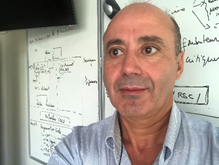
- Update us on the latest news from the Grenoble-Alpes University IDEX (a national Initiatives of Excellence campus).
IDEX has been up and running for two years, and has been evaluated twice by the French government’s investissement d’avenir economic stimulus package steering committee, which includes representatives of the Secretariat General for Investment, the Ministry of Higher Education, Research, and Innovation, and the National Research Agency. So, we can now confidently say that IDEX is achieving its objectives. And the steering committee commended the Grenoble-Alpes University IDEX on precisely what makes it unique. We have demonstrated our capacity to create a single integrated university that will encompass Grenoble-Alpes University, the Grenoble-Alpes University Community, Grenoble Institute of Technology, IEPG, and ENSAG. We have also proven our capabilities in research, innovation, education, international relations, student and campus life, and social and cultural activities.
The single university, which will be established on January 1, 2020, has far-reaching ambitions in terms of excellence in science, technology, and education. It will be a pillar of the local community and a player in the international arena.
- What are IRT Nanoelec and IDEX working together on?
First, we communicate regularly to ensure that our strategies are coherent in terms of the future Grenoble campus. IDEX and IRT Nanoelec are both key stakeholders in Grenoble’s regional and national ecosystems.
We are working toward the same innovation and technology transfer objectives and, more fundamentally, we both support economic development. Our programs also round each other out.
- Where do you think we can work together more extensively?
IDEX has set up large-scale, cross-disciplinary programs that address major socioeconomic issues. The total consolidated budget for these programs is €220 million over three years. Some of these programs are directly related to IRT Nanoelec’s current and future focus areas. Interaction between IRT Nanoelec and our cross-disciplinary programs has already begun, and holds great promise. We need to keep doing what we are doing and continue to build momentum. In terms of education, IDEX plans to make some major innovations in teaching and is investing substantial resources in this area. Synergies between IRT Nanoelec and IDEX are possible and highly desirable.




